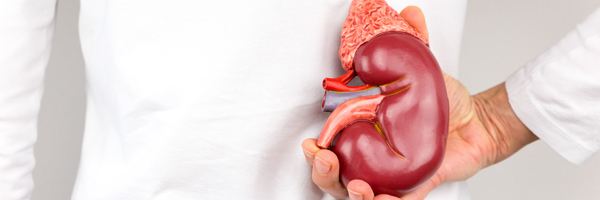Kidney Transplant
What is a kidney transplant?

End-stage kidney failure (also known as renal failure) occurs when the kidney is not able to perform its 90 percent of its function of filtering and removing waste and fluid from the blood by producing urine. Patients will need to remove their waste either through a machine (dialysis) or have a kidney transplant.
A kidney transplant is a surgical procedure to put in place a healthy kidney from a living or deceased donor into someone whose kidneys are unable to perform its main function.
For such patients, a kidney transplant is the preferred option between the two as it offers a better quality of life with fewer dietary restrictions and a lower risk of death.
When should I see a specialist for a kidney transplant?
You may wish to see a renal physician for a kidney transplant when your doctor refers you. The kidney transplant can help treat chronic kidney disease, to improve your quality of life, helping you live longer and better.
Enquire with our renal physicians.Did you know?
In Singapore, the average waiting time for a kidney transplant is 9 years. Singapore’s kidney transplant rate was 20 per million population (pmp) in 2015, which does not meet the required demand that is expected to increase with a longer life expectancy and higher prevalence of chronic disease¹.
What are the risks of a kidney transplant?

A kidney transplant is not without risk. There are risks associated with the following:
The kidney transplant surgical procedure which could include
- leaks or blockages in the ureter (a tube that connects the kidney to the bladder)
- infection
- donated kidney not working
- donated kidney could transmit an infection or a cancer
- excessive bleeding
- blood clots
- donor organ rejection
Side effects from the anti-rejection drugs that you will need to take to prevent your body from rejecting the donated kidney, include:
- diabetes
- high blood pressure
- high cholesterol
- increased risk of skin cancer and lymphoma
- osteoporosis (bone thinning) and osteonecrosis (bone damage)
- excessive hair growth or loss
- infection
- acne
- oedema
- weight gain
How should I prepare for my appointment?
You may want to find our more about your medical team’s expertise as you consider where to have a kidney transplant in Singapore. Here are some suggestions below:
· Number and type of living-donor or deceased-donor transplants done annually
· Skill and expertise of the clinical team
· Survival rates of patients who have had kidney transplants done there
· Understand the total cost of care before, during and after which would include tests, organ harvest, surgery, hospital stay, follow-up appointments and drugs
The medical team will assess if you are
· healthy enough to undergo the surgery and tolerate the life-long rejection medication.
· willing to comply with the medication regimen and suggestions of the transplant team
During the assessment, you may need to undergo
· Imaging scans, such as X-ray, MRI or CT scans
· Blood tests
· Psychological evaluation
With the results, the transplant team will be able to advise if you are suitable for a transplant.
What can I expect during a kidney transplant?

A team of multi-disciplinary specialists perform the living donor kidney transplant. They will evaluate if a donor kidney is a suitable match by testing your:
· blood type as it is better to get a kidney from a donor with the same or compatible blood type to reduce the risk of rejection. Whilst blood type incompatible transplants are possible, it would require further treatment before and after the transplant.
· tissue type for human leukocyte antigen (HLA) which compares the genetic markers that increase the likelihood the transplanted kidney will not be rejected
· crossmatch to determine if your antibodies will react against your donor’s antigens. A negative cross match indicates that you are compatible with the donor and are not likely to reject donor kidney. Positive crossmatch will require additional treatment before and after to reduce the risk of antibodies reacting to the donor kidney.
Kidney transplants are performed under general anesthesia with the specialised surgical team monitoring your heart rate, blood pressure and blood oxygen level. During the procedure, your surgeon will place the new kidney in your pelvis, usually leaving your own kidneys in place. The new kidney’s blood vessels are then connected to the blood vessels in your pelvis with the new kidney’s ureter connected to your bladder.
What happens after my kidney transplant?
After the kidney transplant, you can expect to stay a few days to a week in a hospital for close monitoring. The transplant team will want to check if you are showing any signs of infection and if your kidney is functioning well through the production of urine. This could happen soon after the surgery or take a few days.
You will be asked to return for frequent checkups as you recover, to ensure that your medications are adjusted appropriately. You will be taking anti-rejection drugs, also known as immuno-suppressants, for the rest of your life to keep your immune system from attacking the donor kidney.
Most patients are able to return to their daily activities between 3 to 8 weeks. You will likely be advised to avoid lifting anything heavy until your wound heals which generally takes about 6 weeks.
Request an appointment with a renal physician today.[1] Singapore Ministry of Health. Live On | Facts. https://www.liveon.sg/content/dam/moh_liveon/static/facts.html. Accessed December 8, 2017.

